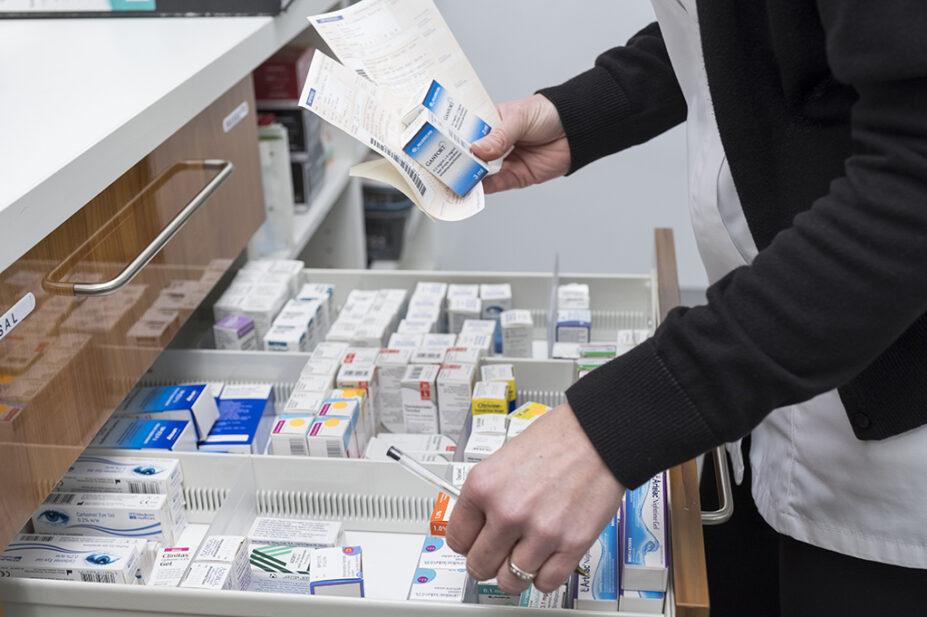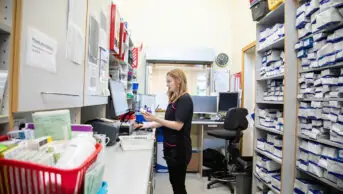
LEWIS HOUGHTON/SCIENCE PHOTO LIBRARY
The UK government has announced it will progress changes to legislation that will enable community pharmacies to set up hub-and-spoke dispensing arrangements with other contractors.
In an effort to ease pressure on general practice, the government published a ‘Delivery plan for recovering access to primary care’ on 9 May 2023, which outlines plans to expand the services offered by community pharmacy in England, to include a ‘Pharmacy First’ common ailments service.
The Pharmacy First service will enable pharmacists to supply prescription-only medicines to patients for seven common ailments, including sore throat, earache and impetigo.
The document said: “We also want to give community pharmacy contractors more choice about how they deploy staff and release pharmacists’ time for more patient-facing services.
“To support this… government will give pharmacists the flexibility to dispense medicines in their original packs and to widen pharmacy hub-and-spoke arrangements, both of which aim to facilitate greater use of automation to increase efficiency, by progressing legislation following the consultations.”
In March 2023, the government announced plans to move forward with amendments to the Human Medicines Regulations 2012 that will allow pharmacists to dispense up to 10% more or less of a medicine compared with the quantity prescribed, if it means they can dispense it in the original pack. However, this flexibility will not apply to controlled drugs.
This decision had followed a consultation that ran between 1 November 2021 and 13 December 2021, to which the National Pharmacy Association (NPA) responded, saying it had “long supported a move to dispensing in original packs wherever possible, to improve both efficiency and patient safety”.
Then, in 2022, the government ran a consultation proposing changes to current legislation that would allow hub-and-spoke pharmacies to operate from different retail businesses — an extension to the current model, where both parts of the system must be operated by the same company.
However, the government has yet to publish the outcome of the consultation.
Gareth Jones, director of corporate affairs at the NPA, said: “The direction of travel — that legislation will be amended to permit hubs to supply to independent spoke pharmacies — was set a number of years ago. However, the date of the change in the law is still to be confirmed.
“The government’s own official impact assessment recognised the limited extent of financial savings that may be possible under the model.
“A solid business case for independents to invest in hub and spoke is actually built on freeing up staff time to deliver funded clinical services. So the cost-benefit equation will shift in favour of hub and spoke the more we see government investing in services like Pharmacy First. A pipeline of services backed by long term funding commitments could start to make the sums add up for hub and spoke for more people — but we should still be measured about the benefits.”
Commenting on the hub-and-spoke plans set out in the delivery plan, a spokesperson for the Department of Health and Social Care told The Pharmaceutical Journal on 10 May 2023: “As set out in the primary care recovery plan, we remain committed to widening pharmacy hub-and-spoke arrangements.
“We are currently finalising a consultation response and it remains our aim to publish this as soon as possible.”
Plans to introduce a hub-and-spoke dispensing model were revived in 2019 with the publication of the ‘NHS long-term plan’, having previously been shelved in 2016 when a government consultation raised concerns among pharmacy professionals.
In their responses to the government’s consultation, pharmacy bodies questioned the benefits of a change the hub-and-spoke model, with the Pharmaceutical Services Negotiating Committee, arguing that there are “virtually no financial efficiencies envisaged by these proposals”.
However, in March 2022, the government estimated that it could save the NHS in England £27.3m over ten years, on the basis that it would create “a 40% to 50% time saving compared to in-store dispensing”.


